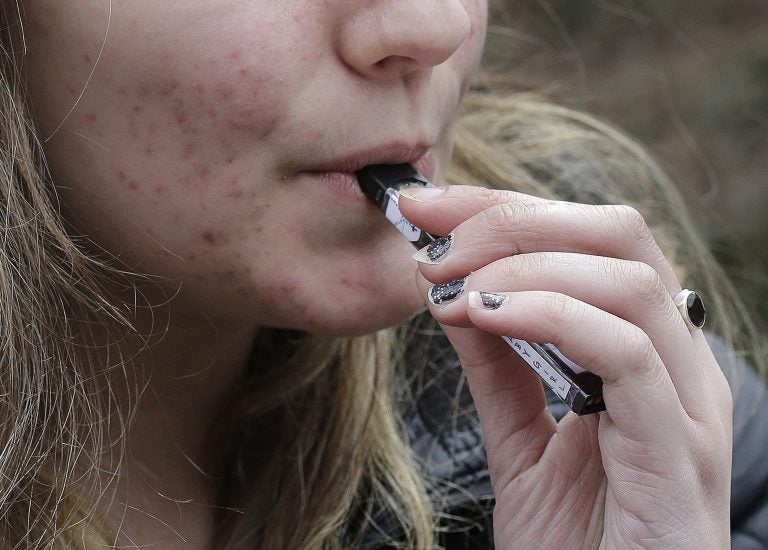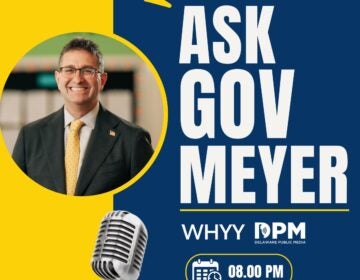Flavored vape ban for minors passes in City Council
By restricting where products can be sold, the law aims to prevent minors from getting addicted, but leaves room for adults who vape to quit smoking.

In this April 11, 2018 file photo, a high school student uses a vaping device near a school campus in Cambridge, Mass. (Steven Senne/AP Photo)
Philadelphia City Council has passed a ban on flavored e-cigarettes in any store open to minors.
The measure approved Thursday targets young people because statistics show that e-cigarettes and vape products like Juul — which can cause nicotine addiction — are particularly popular among them. According to a recent report, approximately 28% of high schoolers in the United States said they had used e-cigarettes within the past month. That’s about 5.3 million young users, up from 3.6 million last year.
The new law allows for the sale of flavored cartridges and e-cigarettes in vape shops and other retail outlets that are already restricted to customers over 18. Cheryl Bettigole of Philadelphia’s Department of Public Health said that was because her agency wanted to make sure the vape products were still available to adults who use them instead of cigarettes.
“We’re really trying to balance protecting kids — which has to be our top priority here — with maintaining some access for chronic smokers, who may be using these products to try to quit smoking,” she said. Bettigole noted that while e-cigarettes are not approved by the Centers for Disease Control and Prevention as a smoking cessation product, the way nicotine gum or patches are, they are legal and they are available outside the city.
Since the local legislation was introduced, the most popular vaping brand, Juul, announced that it would discontinue the sale of its dessert-flavored and mint cartridges, due to their popularity with young people. The CDC also reported that the majority of cases of electronic cigarette or vaping-associated lung injury, or EVALI, were due to vitamin E acetate, which is almost exclusively found in THC products, not tobacco ones.
Despite these national efforts, Bettigole said, the local restrictions for minors are still important because EVALI is just a symptom of a broader problem: teenage nicotine addiction.
“Fortunately, it looks like the CDC has identified the specific culprit in this outbreak,” she said. “But we have to recognize that as long as we have millions of our teens continuing to breathe in unknown substances, there will be another outbreak, and that’s what we’re trying to prevent here in Philadelphia.”
The Philly ban still allows for the sale of tobacco-flavored cartridges and e-cigarettes at corner stores, gas stations, and other all-ages outlets where other tobacco products are sold. The ban also restricts the sale of cartridges or “pods” with high concentrations of nicotine. The nicotine levels are required to be no more than 20 mg, the same maximum level set in the U.K. and other European countries.
City Council paired the vape-products measure with a ban on all flavored cigarillos, or mini-cigars, which also passed.
Council members sponsoring the bill included Curtis Jones, Cindy Bass, Darrell Clarke, and Bill Greenlee. They said they worked alongside the city’s legal team to write the law so it could not be challenged by large vaping companies looking to override it by pointing to less restrictive laws on the state level. That tactic, used often by Big Tobacco in the 1980s, is known as preemption. Altria, formerly Phillip Morris, bought more than a third of Juul shares in 2018 for $12.8 billion.
An even more restrictive ban on flavored vape products in all stores has been proposed at the state level in Harrisburg. That’s more in line with bans passed in big cities across the country. Critics worry those bans would lead adults who use vape products as an alternative to cigarettes to go back to smoking, or to buying the products on the black market.
Philadelphia teens have started suing Juul for false advertising and getting them addicted. As of Nov. 22, there have been 10 confirmed or probable cases of EVALI in Philadelphia, with no deaths. Pennsylvania has 56 confirmed cases and 52 probable cases, with one confirmed death.
Though the city’s limits on flavored vape products may prevent future teens from becoming addicted to nicotine, those who already are may be in short supply when it comes to weaning themselves off.
“We do not have resources, as providers, to be able to make referrals or do something to the degree we need to once we determine that’s the issue,” said Mary Doherty, an addiction specialist who works with teens.
Bettigole said her department has been hearing from pediatricians recommending that teens start on nicotine patches and gum.
WHYY is your source for fact-based, in-depth journalism and information. As a nonprofit organization, we rely on financial support from readers like you. Please give today.





